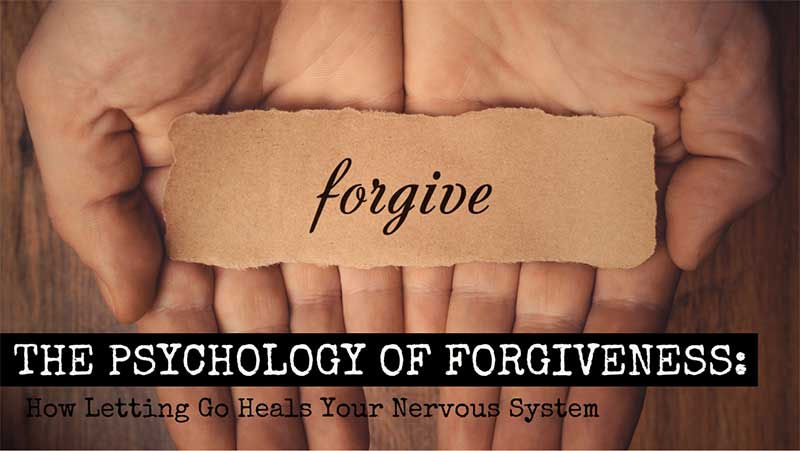The Psychology of Forgiveness: How Letting Go Heals Your Nervous System
- Brandilyn Hallcroft

- Aug 21, 2025
- 3 min read
Forgiveness is often described as a moral or spiritual choice, but psychology and neuroscience show it is also a profound act of self-healing. When you carry resentment, your body and mind remain in a cycle of stress. Letting go does not mean forgetting or excusing what happened; it means accepting and moving forward. It means releasing yourself from the emotional and physical burden of the past.

Understanding Forgiveness Through Psychology
In psychological research, forgiveness is the conscious decision to release feelings of anger or revenge toward someone who has caused harm. It does not mean approval of the behavior, nor does it require reconciliation. Instead, it shifts the focus from the offender to your well-being.
Experts like Dr. Robert Enright have studied forgiveness for decades, finding that it improves mental health, lowers depression and anxiety, and creates greater life satisfaction. Forgiveness also nurtures compassion and empathy, qualities that strengthen your relationships and help you move forward with a clearer mind.
The Nervous System Connection
Holding on to anger and resentment keeps the nervous system stuck in a state of survival. When your body perceives you as being under constant threat, it releases stress hormones, such as cortisol and adrenaline. These chemicals raise blood pressure, disrupt sleep patterns, and compromise the immune system. Over time, unresolved anger can even contribute to chronic health problems.
Forgiveness signals safety to the body. As you begin to release resentment, the parasympathetic nervous system becomes activated. This is the part of the body responsible for rest, repair, and recovery. Your heart rate slows, your breathing steadies, and your body starts to heal. In this way, forgiveness is not only an emotional shift but also a biological reset.
Benefits for Mental Health and Healing
Forgiveness changes how your brain responds to painful memories. Instead of being triggered into stress or fear, the nervous system learns to stay calm and balanced. People who practice forgiveness often experience reduced symptoms of anxiety and depression, better sleep, stronger immunity, and healthier relationships.
The act of forgiving is deeply connected to resilience. When you let go, you free up mental energy that was once consumed by anger. This allows you to focus on growth, joy, and creating a life that feels aligned with who you are becoming.
Forgiveness and Trauma Recovery
For survivors of trauma, forgiveness can feel like an impossible task. The mind often clings to resentment as a form of protection, as if holding on will prevent the harm from happening again. While this reaction is understandable, it also keeps the body locked in cycles of fear and stress.
Trauma-informed therapy often introduces forgiveness as a way to reclaim control. Choosing forgiveness does not mean saying the trauma was acceptable. It means deciding that you will no longer allow the trauma to dictate your nervous system, your emotions, or your future. This choice helps break generational patterns of pain and makes space for healing and freedom.
How to Begin Practicing Forgiveness
Forgiveness is not a single event but an ongoing process. These steps can help:
Acknowledge the hurt. Be honest about what happened and how it affected you.
Feel the emotions fully. Allow anger, grief, or sadness to move through without judgment.
Shift your perspective. See the situation with compassion for yourself and, when possible, a wider view of the other person’s circumstances.
Choose to release. Make a decision that you no longer want resentment to hold power over your life.
Practice self-compassion. Recognize that forgiveness takes time, and extend patience to yourself.
Use healing tools. Journaling, meditation, and therapy can support your nervous system and reinforce the practice of letting go.
Why Forgiveness Frees You
Forgiveness is ultimately an act of freedom. It is not about condoning harmful behavior or denying the reality of what happened. It is about choosing peace over bitterness and health over chronic stress. When you forgive, you loosen the grip of resentment on your mind and body.
The psychology of forgiveness reveals that letting go affects more than just emotions. It allows your nervous system to rest, your body to heal, and your spirit to move forward. Forgiveness is a gift you give yourself, one that restores balance and creates space for deeper resilience, joy, and love.
Begin releasing resentment with the Journals to Healing Forgiveness Journal. Disclaimer: Journaling is a powerful tool to support your healing process. The CBT exercises in Journals to Healing journals are intended to help you analyze and reframe your thoughts as part of a personal growth journey. However, these journals do not replace therapy or professional help. If you are experiencing intense emotions or feelings beyond your control, please seek professional assistance. Resources such as the National Suicide Prevention Lifeline (988) and Crisis Text Line (Text HOME to 741741) are available 24/7 for support. Remember, reaching out for help is a strength, and healing is a process.




Comments